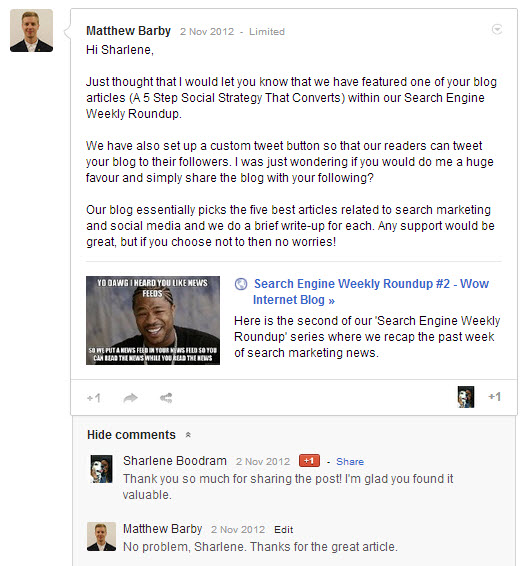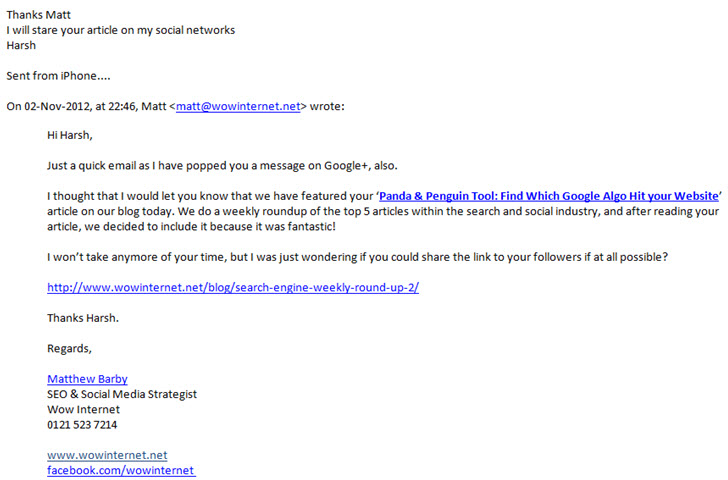As part of a small business, I always find it very frustrating when I read articles about the ‘best ways to build links to your website’. The same things seem to appear each time: create an infographic, get a video to go viral, write an ebook that people can download, produce some white papers, etc. Now, I’m not saying that these methods don’t work, because they are completely legitimate ways of building links. What I get frustrated about is that if you are a business with very low influence and you create this type of new, unique content, it can be quite a struggle to get it in front of those you wish to see it. With this in mind, I thought I would share the methods that I have found to be most effective for all us ‘little guys’.

[image credit: www.telegraph.co.uk]
Forget Link-Building, Think Relationship-Building
After spending a lot of time trying a whole host of different techniques to build that ‘perfect link’, one thing that started to dawn on me was that even if I were to create the greatest bit of content that anyone has ever seen, if I didn’t have a way of getting it in front of people then it would be useless. On top of this, it is very rare that you will be able to continually create the greatest bit of content that anyone has ever seen. The solution? Focus on building relationships with more influential users within social networks.
As part of my day, I dedicate at least an hour to trawling through content from within the search industry, commenting on articles that I like through the likes of Google+, Twitter, etc, and following new users that share interesting content that isn’t just self-promotion. Alongside this I make sure that I keep all of my RSS feeds organised within Google Reader. This allows me to see when new articles that might interest me are published, without having to take too much time out of my schedule. This kind of basic organisation can not only save you a lot of time, but it will help to give your social following some new, interesting content on a regular basis. One of the best articles that I have read this year was from Pak Hou Cheung and it described how to leverage Google reader for guest post opportunities and blogger outreach. Give it a read and I guarantee it will improve your daily productivity two-fold.
Make the Right Relationships
The next hurdle I found was that, actually, it’s not always that easy to become best buddies with the likes of Rand Fishkin, Will Critchlow and AJ Kohn, just by sharing their blog on Google+ and telling them what you liked about it! When looking to build relationships, it is important to build them with the right people at the right time. What I mean by this is that if you are yet to really make your mark in the industry with your content, then it would be a much more effective use of your time to build relationships with those who would gain a mutual benefit from it.
Whenever I create content I always ask the question: why would anyone benefit from sharing it? If the answer is that they probably wouldn’t gain anything, then you need to re-think the content that you are producing. Start off small; build relationships with bloggers that have relatively low influence, but build much more of them. Look for blogs with less activity on them, where the bloggers are in a similar situation to you and would be really happy if you shared their content or linked back to it. I’m not saying that Rand, Will and AJ wouldn’t be really happy if I shared their content, but I don’t think they’d struggle if I didn’t.
So Why Would Anyone Benefit From Sharing My Content?
One of the most effective ways of encouraging people to share your content is by promoting their content and adding value to it. One very simple method we use at Wow Internet is to create a weekly ‘Search Engine News Roundup’. This involves taking 5 articles that we found particularly useful from within the search industry and giving them a short write up, with a link back to each of the respective blogs. We always try to make sure that we source articles from different authors every week and find articles that aren’t exclusively from hugely popular blogs. Once we have done this, I contact each of the authors through Google+, mention them in a tweet about our blog and send them an email (if I have the author’s email address, which is usually available on their blog).

Another little trick that we use is placing a custom Tweet button next to the link of each article that we have featured in the ‘Search Engine News Roundup’. The custom Tweet button includes a link to the featured blog, a brief message about the article, the original author’s Twitter handle and the Wow Internet Twitter handle (so that the author knows it has been shared from our blog). Below is an example Tweet that comes from the button:
“Great blog from @justincutroni talking about the Next Generation of Google Analytics – http://cutroni.com/blog/2012/10/29/universal-analytics-the-next-generation-of-google-analytics/ via @wow_internet”
You may notice that there is no link back to our blog here. The reason for this is that the whole focus is around promoting the content of others, in order to build relationships and give the author a reason to want to subsequently share our content. This will help drive social signals to the featured article, which will give the author another answer to ‘Why it would benefit me to share their content?’

The key message that I am trying to get across is that you need to add value to the content that you are sharing. By doing this we are able to reach a wider audience with our content, which can increase the social signals going back to our site and could also persuade people to bookmark our blog, in order to view our future content. This is the most valuable thing for me, because it means that any content that I produce in the future will have a greater level of exposure.
Another very effective way of getting more worth out of the links built to your website is by boosting the authority of webpages that link to you. This is a tactic that I’m sure many of you use on a regular basis. If I am linking to someone else’s content it would make sense for them to think about linking back to me in order to boost the power of the link that I have given them. Through linking to others’ material it will increase the likelihood that they will then share your content in order to boost the power of the link they have received, which works brilliant for both parties involved.
A True Story
Around a couple of months ago Larry Kim posted a fantastic blog on SEOmoz, which showcased his company’s (WordStream) keyword analysis software. Within the blog, Larry offered a free one-year trial of the software to anyone that dropped him an email requesting it. Being a lover of bargains and on the lookout for new tools that can benefit our client’s SEO performance, I took Larry up on the offer. When I got a message back from Larry himself arranging for an activation key to be sent over, I suddenly had a brain-wave…
Larry’s objective for his blog is clear: he wanted to get more people from within the SEO industry signed up to use his product and generate awareness for the brand in general. The question I then asked was, how can I add value to what Larry is trying to achieve, in a way that would also benefit my own objectives?
I started using the keyword analysis suite from WordStream and really liked it. It dramatically improved the way in which we could carry out keyword analysis for our clients and gave us an extra resource to utilise. After using the software I made it a priority to share my positive experience with my followers, and what better way to do this than to blog about it? In order to get Larry’s attention I knew that I needed to add value to what he was trying to achieve, in a way that would appeal to his target audience. So I decided to write an article titled ‘Improving Your Keyword Analysis With WordStream’. In the article I discussed the features I like most and how they can be used specifically to improve the keyword analysis process of any given SEO campaign. I made sure that I linked back to Larry and added in a few particularly ‘quotable’ lines (I will explain this shortly).
My next step was to get in touch with Larry. I dropped him an email to tell him about the blog and how much I enjoyed the keyword research suite. I then asked if he would be kind enough to share the article with his social following. Then I fired it across to all of my social following, making sure to tag Larry in the posts. Shortly after I received this email back from Larry:
Hi Matt,
Thanks for writing this up.
I’ve tweeted it, submitted to inbound.org: http://inbound.org/seo/2012/09/improving-your-keyword-analysis-with-wordstream-wow-internet-blog/
and shared on my facebook and google+ page.
I’ve asked the people who do our company social stuff to share as well.
Thanks again!
Larry
Before I wrote the blog I had checked out the WordStream website to see if there would be any kind of opportunity for me to get something more solid than just the article shared by Larry. What I found was a testimonials page that was populated by only a handful of companies, including the likes of Search Engine Land. I spotted this as a potential link target for the Wow Internet website. This is where the quotable part of the blog came in handy!
I replied to Larry’s email to let him know that I would be more than happy for him to use any part of the blog as a review for his product, which could be displayed on his website. It turned out that I was in luck, because he was more than happy to do it. In fact, when you think about it this was incredibly beneficial for both of us; I get a link from a high authority page back to our domain and Larry gets a credible review of his product, from a company within the industry he is trying to target.

Not only did Larry link to our homepage, but he also linked to a couple of our inside pages with some very good anchor text indeed. Thanks again Larry! You can see it for yourself here:
http://www.wordstream.com/reviews
The moral of the story here is to understand exactly how you can bring value to the people that you reach out to. Only once you have understood how you can benefit them, should you even consider how they can benefit you.
Final Tip: Keep At It.
The last bit of advice I would give is to simply keep at it. This kind of link building can be very frustrating, as I’m sure you have realised, but hopefully these kinds of small success stories will inspire all you little guys out there to keep trying!
I hope this has been helpful to some of you out there and I would love to hear any of you feedback (both negative and positive, but please be nice!). Oh, and sharing this to your social following would be a great help 😉
About Matthew Barby — Oversee online marketing at Wow Internet. I try to blog as regularly as I can and cover all aspects of online marketing, from developing unique social media strategies through to technical SEO advice. Always looking for new content to talk about and share so feel free to get in touch!
